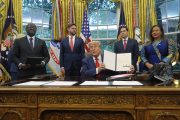
It’s sadly ironic that on the 20th anniversary of 9/11, which the Biden administration presumably hoped would mark a triumphant withdrawal from Afghanistan, the Taliban can instead celebrate a triumphant return to power.
In America, however, today isn’t a time to tout victories but commemorate the losses of parents and siblings and children and heroes, and official ceremonies are underway across the country. Rocker Bruce Springstein moved viewers to tears with what’s described as a “haunting” performance at the World Trade Center memorial plaza; President Trump visited with Big Apple police officers and released a video message; and Joe Biden is going to appear at all three sites attacked 20 years ago, in New York, Virginia, and Pennsylvania.
Then there’s former president G.W. Bush. He was less than a year into his first term when 19 Muslim jihadists hijacked four airplanes on Tuesday, September 11, 2001, crashing two into the World Trade Center and one into the Pentagon; the fourth, United Airlines Flight 93, crashed into a field near Shanksville, Pennsylvania, when passengers and crew bravely took physical action to thwart the terrorists. Bush gave a speech at a Shanksville service Saturday, honoring those fallen heroes. “Today, we remember your loss, we share your sorrow, and we honor the men and women you have loved so long and so well,” he stated.
The ex-president also had a warning and a lament, however. “He said that the years that followed [9/11] revealed that ‘dangers can come not only across borders but from violence that gathers within’ from ‘violent extremists abroad and at home,’ whose ‘disregard for human life’ and ‘determination to destroy national symbols’ are ‘children of the same foul spirit, and it is our duty to confront them,’” reports the Independent. Bush could have been alluding to BLM and Antifa and those tearing down statues and renaming buildings, but he didn’t specify.
Bush additionally expressed concern about our (Dis)United States. “‘In the weeks and months following the 9/11 attacks, I was proud to lead an amazing, resilient, united people,’ Bush said,” relates the AFP.
“‘When it comes to the unity of America, those days seem distant from our own,’ he continued.”
“‘So much of our politics has become a naked appeal to anger, fear, and resentment,’” the site further relates. “‘That leaves us worried about our nation and our future together.’”
In speaking of the naked appeals, Bush could have been alluding to stoked anger at Trump supporters, whites, or a number of other people and things; fear ginned up over a virus; and resentment based on woke illusions. It’s possible, anyway, though improbable. He surely is right, however, about our current disunity. Here’s where he’s wrong:
We were likewise divided in 2001, just not as severely or visibly.
Some may fancy that the true test of a nation’s unity is its behavior when attacked. This is a myth.
A land’s unity is truly tested when it’s at peace.
Ancient Greek city-states, such as Athens and Sparta, united to fight Persia, but began battling each other 18 years later (the Peloponnesian War). At Pope Urban II’s urging, fractious medieval Europeans united to fight the Muslim armies imperiling Christendom in what became known as the Crusades, but subsequently fought countless wars against each other. We united with psychopathic mass murderer Joseph Stalin during WWII to combat the Nazis, but afterwards contended with his USSR in the Cold War.
Just as two men who share nothing will instinctively band together when set upon by two thugs throwing haymakers, it goes without saying that an assailed people will unite against a common enemy. It’s when that enemy is gone that you learn if they have anything else in common.
Right after 9/11, I remember that late comedienne Joan Rivers commented on the radio about the attack and said, quite seriously and passionately, that political correctness was going to have to go out the window.
It didn’t, of course.
Instead, it metastasized into the more intense form dubbed “wokeness” precisely because having a common external enemy doesn’t change fundamental internal problems. An enemy without’s emergence doesn’t stop an enemy within’s insurgence.
Of course, who’s considered the “enemy within” depends on whom you ask. This brings us to why much of the talk and complaints about “disunity” get tiresome if not downright irritating. Much of it is framed as if we’re mere children bickering over a toy or the last piece of pie. “C’mon, kids, just get along!” But unlike pie, you can’t share and share alike mixing good with evil and emerge better for it (though conservatives so often try, ever compromising on principle).
We’re divided over fundamental issues, such as life and respect for it, the nature of marriage, what is proper sexuality, whether male and female are biological reality or mere social constructs, whether our Founders and foundation should be revered or reviled, whether morality is real or relative, etc. We ain’t just disagreeing over the color of drapes.
And what is this obsession with “unity,” anyway? Did not Jesus, whom Christians consider divine and most other Americans respect immensely, say “Suppose ye that I am come to give peace on earth? I tell you, Nay; but rather division”?
The point: Worse than principle-born division is unity around a lie.
Shallow calls for unity are intellectually lazy at best, cowardly at worst. They merely lament symptoms without making a proper diagnosis, addressing etiology (causes), or prescribing remedy.
The irony of the Afghanistan outcome is that the country, back under the Taliban, may end up being almost exactly as it was in 2001. We, however, will not. We’re further down the rabbit hole of the ultimate dividing force — moral relativism — which fractures society because everyone can make everything relative to himself.
The only thing worth uniting around is Truth. And insofar as people reject it, disunity is a blessed state.




